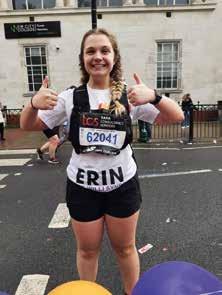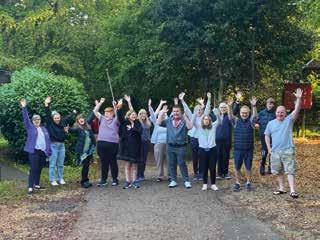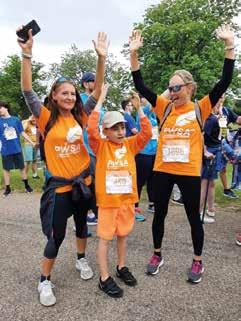PWS news













Chief Executive
Jackie Lodge jlodge@pwsa.co.uk
Fundraising Manager
Karen Wilkinson kwilkinson@pwsa.co.uk
Support Team Manager
Patsy Lecont plecont@pwsa.co.uk
Communications Manager
Jonathan Horsfall jhorsfall@pwsa.co.uk
Support and Training Officer
Ruth Consterdine rconsterdine@pwsa.co.uk
Support and Training Officer
Sheila Inwards sinwards@pwsa.co.uk
Support and Training Officer
Sarah Brindle sbrindle@pwsa.co.uk
Office and Finance Manager
Vicki Cooke vcooke@pwsa.co.uk
Office Administrator
Lizzie Pratt lpratt@pwsa.co.uk
Project Manager
Myles Kelly mkellyt@pwsa.co.uk
Welcome to your winter edition of PWS News. I hope you all had a fantastic Christmas and New Year, which already feel like they were both a long time ago now! As I write, the weather has started to turn cold after a mild but incredibly wet festive period. I hope you’ve managed to stay safe from any flooding in your local area.
In the support section of this edition, we are beginning a focus on ‘going back to basics’ - that is, taking a closer look at specific aspects of PWS that you may not be as familiar with as you’d like – or maybe you are, but it would just be useful to read up on them again!
So, in this issue, you can find information on topics such as chromosome 15, historical characteristics, hypogonadism, skin picking and hoarding, and we also have Ruth’s

regular round-up of news from the wider world of PWS!
We also have plenty of news from our Association too, including planned changes to membership arrangements, and updates from our AGM and our first Town Hall meeting.
You can also find the usual sections on fundraising, research and community events. I hope you enjoy this issue of PWS News and, as always, if there’s anything you’d like to see in a future edition, then please do let me know. This is your magazine and we would very much like it to reflect what our community is doing and what it is interested in!
Jonathan
Jonathan Horsfall Communications Manager jhorsfall@pwsa.co.uk
If you are writing to us, please note the following, which will help ensure that, firstly, whatever you’re sending gets to us and, secondly, when it does reach us, we know who it is from and what it is for:
1. Please note that all postal correspondence must be sent to our Northampton address, which is PWSA UK, c/o Metcalf’s Commercial Decorators, Unit 5, 3 Deer Park Road, Moulton Park Industrial Estate, Northampton, NN3 6RX. Anything sent to any other address (including our previous PO Box address) will NOT reach us.
2. Please include a note so that we know who you are (including your address) and what the item sent is for. For example, if sending cheques then please let us know if this is a donation or payment for a specific order of merchandise, otherwise we won’t know and may not be able to contact you to find out!
3. Finally, please ensure that you put the correct postage on your envelopes, including the new barcoded stamps. If there is incorrect postage (including older stamps without barcodes) then we have to pay the shortfall ourselves before we can receive the letter.
Other portals into the PWS World/Community include:
PWSA UK Website: www.pwsa.co.uk
X (formerly Twitter) @PWSAUK
Facebook: Prader-Willi Syndrome Association UK LinkedIn: linkedin.com/ company/pwsauk
Instagram: PWSAUK
Facebook groups:
PWSA UK Community Hub: Empowering Life with PWS
PWSA UK Address
PWSA UK, c/o Metcalf’s Commercial Decorators, 3 Deer Park Road, Moulton Park, Northampton, NN3 6RX T: 01332 365676 • E: admin@pwsa.co.uk • www.pwsa.co.uk
Royal Patron: HRH Princess Michael of Kent Patron: Prof AJ Holland
Hon Chair: Danny Leslie Hon Treasurer: Matthew Christensen
Office opening hours: 9.00am - 5.00pm (Mon-Thu) and 9.00am – 1.00pm (Fri).
Answerphone available at all other times
Facebook community groups: PWS Families; Prader-Willi Syndrome Support UK; Lovebugs of the UK (PWS); PWS Adults & Carers Unite
PWSA UK Sibs Hub (closed Facebook page for siblings)


Let’s take a look at chromosome 15, and the different sub types of PWS. As always, it’s important to remember that PWS happens at conception – no one is to blame. It can happen to anyone at any time.
Welcome to the support section for this winter magazine. We looked back at topics over the last couple of years and have decided to go back to basics for this edition. We will be looking at the chromosome subtypes, historical characteristics, how diagnosis has changed, historical observations and then focus on hypogonadism, skin picking and anxiety, including hoarding and collecting. We will then follow this subject on in the spring edition with focus on other aspects of PWS.
We always welcome feedback on our articles, so please do let us know what you think, and what other topics you would like to see us cover – we want to make sure we are talking about the things that matter to you.
Translocation/imprinting defects – A very small piece of chromosome 15 breaks off and transfers to another part, which results in rearrangement of the genes, or there is a defect in the function of that very small piece of chromosome. This subtype is much rarer and only accounts for 2-5% of cases.
It can be interesting to know the subtype, because there are some very subtle differences – for example, those with paternal deletion look very similar to each other and are often mistaken for siblings. Some studies have shown that skin picking and hypopigmentation (unusually fair eyes, skin and hair) are more common in those with paternal deletion. For those with UPD, they may be more affected by anxiety and autistic traits, such as the need for routine and finding change difficult. If your son or daughter has a translocation or imprinting defect, there is a small chance that you may have another child with PWS.
We all have 23 pairs of chromosomes (one pair from our mother and one pair from our father). In PWS, a very small region of chromosome 15 is affected in one of three main ways:
Paternal deletion - A small section of the chromosome 15 from the father is missing or has been deleted. This is the most common sub type of PWS, accounting for around 65-75% of cases.
Maternal disomy (also known as Uni parental disomy or UPD) – Two chromosome 15s are received from the mother, and none from the father. This accounts for around 20-30% of all cases.
Our Vision:
Overcome the challenges of Prader-Willi syndrome.
Our Mission Statement:
To ensure every member of the PWS community has access to high quality care, opportunity and support, and to promote awareness, build knowledge and further research in order to overcome the challenges of PWS.
We know with certainty that, regardless of subtype, every individual with PWS will have hypotonia (poor muscle tone) and hyperphagia (a feeling of extreme, insatiable hunger) to some degree. However, we also know that PWS is only a small part of your son or daughter, and whilst it can have a huge impact, it doesn’t define them. PWS is something that they have, not who they are.
If you’d like to know more about the different subtypes of PWS, or if you have any questions, just give us a call or drop an email to supportteam@pwsa.co.uk.
Want to be kept up to date with the latest news?
PWS Weekly Round-Up is a great service offered by the Association to keep you informed about training, family and fundraising events, new research and much, much, more! If you would like to sign up for this service, please contact Jonathan at jhorsfall@pwsa.co.uk or call the office.
For many parents with adults who have PWS, you may remember the explanation during diagnosis, prior to genetic testing. The doctors would have used characteristics like blonde hair, blue eyes, fair skin, protruding forehead, downturned mouth, small genitals, puffy hands and feet, and floppy. Even on the NHS web page today, it states many of these as a guide for those who think they may have a child or adult with PWS. Let’s, for example, look at some of our babies in the photos and see if we think those guidelines would have helped.



There are of course the similarities that are common, such as being floppy and having hypotonia, leading to issues such as failing to thrive. Also, for males it is easier to notice smaller genitals – again, not in all cases. However, these are clear signs that genetic testing is required and for many this is completed very soon after birth. We still have children that get missed, even with all the evidence we have, how much is shared with professionals, and the information available in medical journals. In 1985, a medical journal said Prader-Willi syndrome was discovered by Dr Prader, Dr Willi and Dr Labhart. This was all - no symptoms, diagnosis or treatment!
Today, we have the internet and even though this can be a dangerous place to read as a parent, for a professional
As part of our back to basics edition, we are taking a look at one of the common characteristics of PWS called hypogonadism.
What is it?
Hypogonadism is a condition in which the body doesn't produce enough of the hormone that plays a key role in growth and development during puberty. Men are unable to produce enough testosterone, women are unable to produce enough oestrogen, and it’s very common for genitalia to be small. This can be harder to spot in women – however, scans have shown that the uterus is often small and under-developed. Menstrual cycles are often irregular and rarely start on their own. Although it may not seem important, the inability to produce sex hormones causes delayed puberty (where people with PWS are ‘stuck’ in pre-pubescence) and can lead to a range of health issues. For women, it is really important to have and complete a menstrual cycle –without it there is a much greater risk of osteoporosis and in extreme cases, breast cancer. For men, the risk of
they could put in ‘floppy baby’ and ‘small genitals’, Prader-Willi syndrome is at the top.
Things have come a long way and research is still happening which will help those currently living with PWS and those will do so in future.
Thankfully, nowadays we have genetics to confirm diagnosis alongside the doctors’ initial observations.
The specific diagnostic genetic test made a huge difference to the identification of the condition and means that the majority of children are diagnosed from a young age, although not all.
The gold standard genetic test to assess for PWS is the ‘15q11 methylation test’, and this is what doctors had to request in the past. Nowadays, requests can be easier, and doctors can just request the ‘gene panel for PraderWilli syndrome’ for the right test to be done. Once this test has proven the child has PWS, follow up tests are done using parents’ DNA, to find out the exact genetic mechanism that has led to PWS.
This has led to considerable progress in professionals’ knowledge, through research and experience working with children and families long term. This has contributed to advice and health interventions (such as growth hormone and other hormones, diet, illness, multi-disciplinary roles) and understanding the needs of children and families.
We see a small proportion of children who were diagnosed beyond infancy. This may be because they were not as hypotonic (in other words, not as floppy), did not have much difficulty sucking and feeding, or other delays in their early development. We are always interested in learning from their stories.
A lot of international research and collaboration has led to interventions and changes in what we can offer and advise.
osteoporosis is also significant, along with a noticeable lack of facial and pubic hair.
Infertility amongst those with PWS is wide reaching because of hypogonadism. To date, we are aware of 7 pregnancies, 3 of which have been in the UK, and we are unaware of any men having fathered a child.
How is it treated?
Fortunately, hypogonadism is easily treated with a prescription of sex hormones. Your son or daughter’s endocrinologist will be able to arrange this and there are a number of ways they can be given. Most commonly, oestrogen is given via a patch and testosterone is given in the form of a topical gel. Both hormones will be prescribed at a low dose to begin with, allowing time for the body to adjust. Sex hormones can be prescribed as early as from the age of 16, but it’s important that blood tests or ultrasound scans are carried out beforehand.
If you have any questions, or would like more information, just give us a call on 01332 365676 or send us an email at supportteam@pwsa.co.uk.
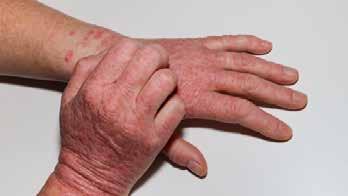
We know that skin picking, also known as excoriation disorder, occurs in approximately 70% of individuals with PWS and can be intermittent. Skin picking is sometimes exacerbated by having a scab from a small injury or insect bite which can cause irritation for a short period. However, in some cases, continual picking can become a problem, to the point of having an open wound that can become infected.
It is thought that people who pick their skin find it a pleasurable sensation, meaning that they produce endorphins which in turn means it becomes habit forming. Others may pick because they are bored, anxious or struggling emotionally to cope with something and picking can bring relief.
There are a number of strategies to try to alleviate this, including the ones listed below:
Keeping nails short
Providing an alternative such as skin brushing
Using Vaseline to cover the affected area as it makes the skin slippery and more difficult to pick at
Using bandages/plasters to cover the area
Using distraction techniques
Getting physical exercise
Taking photos of the affected area, providing a target for healing with further photos to show progress
Parent 1 – skin picking:
“I never realised it would be so difficult to write about the dreaded subject of skin picking. What this has made me realise is that we do not discuss it enough and there is a lack of meaningful research and helping strategies.
“For my family it can be one of the most challenging behaviours with constant picking in many different areas. Just when you think you have solved one area it can suddenly manifest somewhere else. For example, face to nose to head.
“It can be so hard to control without inducing an outburst, particularly at night time. It is always denied and they cannot comprehend the damage done, such as a likelihood of infection and long-term scarring.
“It is a compulsive action; many times they are not
Rewards can be used but should never be food based
The NHS website suggests making an appointment with your child or adult’s GP if skin picking is becoming a problem. They may refer them to a dermatologist if they think that an underlying cause such as eczema is the problem, or they may refer to psychiatric services, and talking therapies such as cognitive behavioural therapy (CBT) may help.
There has been some success with treatments including N-Acetylcysteine, a nutritional supplement which some people have found to be useful in reducing skin picking. N-acetylcysteine (NAC) is a supplement derived from the amino acid L-cysteine, which is found in most highprotein foods such as chicken, yoghurt, cheese and eggs. This means that those on restricted diets may struggle to get enough L-cysteine from their diet.
Although this supplement can be bought over the counter at health food shops, we would always recommend seeking the advice of a GP before taking any supplements. It’s also important to be aware that this supplement may cause unwanted side effects and that the suggested dosage may be in excess of what is required in PWS.
You can find some useful information on skin picking in PWS on the Pittsburgh Partnership website, where you can download the information written by Linda Gourash. She has some advice around anal and/or vaginal picking which can be distressing for the person and their carers. You may not know this is happening, but signs to be aware of include blood and/or faeces smeared on the wall next to the toilet or next to their bed. It is thought that this can start with the person being constipated or having other problems such as an infection or sensation of itchiness. In her article, Linda talks about rectal picking as a reaction to stress or anxiety, she also suggests that certain antidepressant medication can have a negative impact on this problem. She suggests exploring your child/adult’s stress factors with a focus on sensory issues such as noise and tone of voice.
aware of the impact it is doing. It can suddenly start without any reason and can simply be down to routine and habit. However, being bored and stressed can definitely increase picking.
“We have tried many tactics to help reduce the impact of skin picking with limited success, although have found perhaps the dog can be the best help or distraction.
“When the skin is broken, a quick proactive approach is definitely required to help reduce the likelihood of infection. Spray plaster when asleep definitely helps.
“For us the best way to reduce the impact of skin picking is to have a constant message and to keep reinforcing the idea to stop. It is most definitely a joint process between all of us.
“More research is certainly needed on skin picking as it is extremely difficult to stop.”
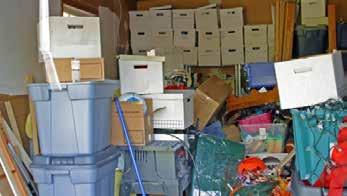
“To quote the IPWSO website: ‘Many people with Prader-Willi syndrome engage in repetitive behaviours and rituals. Sometimes these behaviours can be beneficial. However, not all rituals are beneficial and over time some people with PWS can become so set in following a routine that this can lead to problems, for example hoarding and skin picking’.
“Hoarding, ordering and arranging objects, if given half a chance, is Jonathan’s happy place. He has in the past cluttered his bedroom with huge quantities of pamphlets, pens, magazines and catalogues, filling all possible storage spaces and beyond. Other times he has stockpiled toiletries, shampoo, body wash, hair creams, potions and deodorants to such a degree that we referred to his collection as an extension of Superdrug. We had initially actively encouraged him to have creams and potions to apply to help stop the skin picking, so found ourselves caught in the cycle ourselves!
“From the IPWSO website: ‘The drive to seek and collect items is thought to be genetically related to the drive to seek and consume food. But it can also be stressful for the person with PWS by disturbing their attention and engagement in activities, even those they enjoy’.
“Our guesses as to why Jonathan needs to hoard (he has never seen it as a problem) range around it giving him a sense of self-worth in having ownership, a sense of collecting as an activity in itself much like children collecting stickers, to simply money burning a hole in his pocket or to knowing he could have his own way in a shop. It has never seemed to be driven by any concern of not having enough, it was never about running out.
“Jonathan has always been drawn to charity shops, probably because you can get a lot for your money! The hoarding would seem to be about quantity not quality. To date, Jonathan has around one thousand CDs and DVDs. Fortunately, he does not feel the need to keep the boxes.
“It is unhealthy to hoard. We have to decide when it is appropriate to step in and also consider if some other issue may be more important to address at any given time.
“There have been times when Jonathan was obviously overwhelmed by what he had and couldn’t sort it, which
did give us the chance to step in, but at other times it has been very hard to judge what will work and when and how to step in.
“There are some ideas on the PWSA website that may help if you can predict and see what is happening before it has gone beyond collection to clutter, to hoard. Look for opportunities to try different ideas to help.
“For us, a successful strategy has been during changes in accommodation to move only a reasonable quantity of items and store the remainder elsewhere, suggesting Jon can access them when he uses up what he has. Generally, this “store” is forgotten after the first replenishment or he can then be persuaded to share some of these stores to others given he has so much, but this isn’t always possible as he removes all labels!
“Recently, due to incidents in shops, Jonathan’s care providers have, under the guise of budgetary control, changed his shopping routine from using a bank card to providing him with £5 cash a day to spend on incidentals which has limited his opportunity to buy, given his routine of buying a coffee every day which uses up over half! This has been a really valuable step to reducing hoarding.
“Skin picking on the IPWSO website: ‘People with PWS have a high pain threshold and do not feel pain so intensely. Skin picking or scratching is a common behaviour seen in people with Prader-Willi syndrome (PWS). The intensity and duration of this behaviour varies from person to person and episode to episode. It may occur in the form of scratching an insect bite until it bleeds and becomes an infected sore or it may manifest in the form of nose picking or anal picking. The behaviour is thought to start in response to boredom, stress and anxiety or as a form of selfstimulation’.
“Speaking to Jonathan about his skin picking he suggests it was because of boredom. There are many scars to show his past struggles on face, arms, legs and feet - sometimes picking a scratch already there and other times making a hole deliberately.
“Over the years we tried all the ideas on the website. All were successful for a season. These included: routine cutting of fingernails
daily use of moisturiser for fingers, hands and arms: it is best if the moisturiser is applied by the person with PWS
positive reinforcement for healthy, good-looking skin
keeping hands occupied, daily sensory stimulation of the hands and arms – e.g. massage. Jonathan also had regular foot massage.
“The following from the website also rings true with Jonathan:
skin picking often occurs in waves.
an aloe vera based cream works very well on the sores
tell the person how wonderful their “unpicked” skin is
tell the person you want to help their sore to heal give verbal praise for periods of time spent not picking
we also tried ignoring it
“It is always worth trying an idea but best not to sweat over it. I can say this with hindsight! It is unsightly. It can, did and does lead to infections but Jonathan loves all the attention, antibiotics and creams that are readily available.
“Jonathan has also been taking NAC-Nacetyl Cysteine. A food supplement recommended by Dr Tony Goldstone for the last 8 years. This may be of some help. You can order it on Amazon.
“Everyone is an individual so I hope some of these experiences we have had might be of help and also comfort that you are not doing this alone.”
Compiled by Ruth Consterdine Family fund
From: The Council for Disabled Children
Visit: https://councilfordisabledchildren.org.uk/workus/membership/meet-our-members/family-fund
Family Fund has opened the new support for families with disabled children (SFDC) grant programme in England, for families with disabled or seriously ill children and young people aged 17 or under and living on a low income.
The SFDC programme is funded by the Department for Education and offers grants for a wide range of items to make family life easier. The application process has been changed to make it simpler to apply, and many grant awards will be made more quickly. If you have further questions, get in touch with Clare.Bonetree@familyfund.org.uk

You can apply for:
Family breaks and/or days out
Clothing
Furniture, kitchen appliances and household items
Specialist trikes/bikes and outdoor play
Computers, tablets, games consoles
Family Fund in Scotland Northern Ireland and Wales
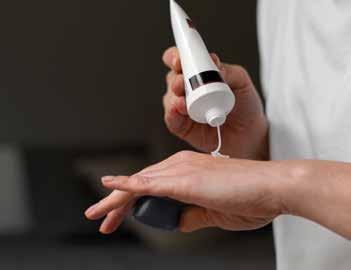
As we go to print, the Family Fund in Wales is closed due to funding availability.
Visit the links below for more information and to find the eligibility criteria. Families in Scotland can apply for a Family Fund grant every 18 months or 24 months in Northern Ireland.
Family Fund Scotland - www.familyfund.org.uk/grants/ schemes/scotland-core-programme
Family Fund NI - www.familyfund.org.uk/grants/ schemes/northern-ireland-core-programme
From: Contact
Visit: contact.org.uk/about-contact/news-and-views/ disabled-childrens-social-care-law-to-be-reviewed
On 6th November 2023, Contact published an article about the review of children’s social care legislation in England, which is being undertaken by the Law Commission, something both Contact on the Disabled Children’s Partnership have been campaigning for over the last five years.
What is the aim of the review?
Currently a patchwork of legislation governs disabled children’s social care law, some of which dates back more than five decades. This has contributed to a variation in the amount and quality of support local authorities provide. It has also complicated the routes to accessing support for parents with disabled children.
The overarching aim of the review will be to simplify and strengthen the law ensuring that the system is fair and works for children, parents and local authorities. Jesslyn Parks, senior advisor at Contact, says social care is consistently the third most common inquiry to their helpline, with families struggling to understand what support they are eligible for.
The Law Commission aims to publish a consultation in spring 2024. It hopes to engage with parents through a combination of online discussion sessions and surveys to better understand barriers to accessing social care.
STOMP stands for Stopping Over Medication of People with a learning disability, autism or both.
STAMP stands for Supporting Treatment and Appropriate Medication in Paediatrics.
NHS England has launched a consultation about people’s experiences of medication. Sometimes, individuals with learning disabilities are over-prescribed medications like sedatives and antipsychotics, instead of getting the right support. The NHS would like to ask autistic people and those with a learning disability; their families and carers about psychotropic medication, which is any medication that affects the mind.
Please complete the survey at www.engage.england.nhs.uk/survey/5711c69b/
You have until 26th Feb 2024 to do this.
In April 2003, the Government announced it was establishing an innovation and improvement unit to develop and define fine clear priorities across adult social care. As part of this work, it is setting out a list of priorities for innovation and scaling and care and support including recognising identifying and supporting unpaid carers.
There are 12 priorities under the following three objectives:
1. People have choice, control and support to live independent lives
2. People can access outstanding quality and tailored care and support
3. People find adult social care fair and accessible
You can read about the priorities by visiting this link to the government website where you will also find an easy read version: www.gov.uk/government/publications/ accelerating-reform-in-adult-social-care-in-england
In March 2023, the Government published its SEND and Alternative Provision Improvement Plan which sets out which of the proposals in its SEND green paper the Department for Education intends to implement. One of the steps in this plan is the SEND Change Programme, a national programme to test some of the changes the Government wants to make. It is being delivered in each of the nine regions of England, each led by at least one named local authority. In IPSEA’s article - SEND Change Programme: what you need to know - www.ipsea.org. uk/send-change-programme-what-you-need-to-know, it sets out which local authorities are involved. If you live in one of these local authorities it is important to understand that the programme cannot introduce changes that are outside the law. Children’s legal rights and entitlements remain unchanged.
We looked at ‘Entering the World of Work’. Since writing that article, Ryan Inwards has been accepted on to a ‘Supported Internship’ which he is very excited about. He told me that his social worker put him in touch with the programme and then his mum, Sheila, had a meeting with the organisation online. Ryan was interviewed online with support from his mum, and he said it wasn’t scary at all. They asked him what sort of work he would like to do and a bit about himself. Ryan starts his course in January where he will be learning about journey planning and the skills he needs to take on a job. He told me that he will have his own job coach who stays with him throughout the course.
If you would like to find out more about this, have a look at the information below and use the highlighted links to find out what resources are available and how to apply.
All local authorities across England are taking part in the Supported Internship Programme; their main aims are to set up a local SEND Employment Forum and to increase opportunities for Supported Internships in their area.
I would recommend your adult or young person starts by having a look at their local offer and get in touch with their local authority directly. You can also call a careers advisor on 0800 100 900. There is more information on the Government website: nationalcareers.service.gov.uk/explore-your-educationand-training-choices/supported-internship
People who employ personal assistants can apply for money to pay for training to develop the knowledge and skills of their personal assistants and themselves as an employer. This opportunity is open to people who are in receipt of a social care direct payment and those that use their own money to employ personal assistants. Funding can be used for:

Personal assistants’ training and development needs
The development of their knowledge and skills as an employer
Hiring replacement support whilst your usual personal assistant is attending training courses. You can apply any time between now and 5pm on 15th March 2024.
Find out more and apply at www.skillsforcare.org.uk/ Funding/Individual-Employer-Funding/IndividualEmployer-Funding.aspx
Danny Leslie, PWSA UK’s Chair of Trustees, shares his report from our recent AGM
PWSA UK continues to develop and respond to the changing environment and challenges that brings. The cost-of-living crisis has impacted not only our community, inhibiting the Association’s ability to raise funds, but also access to services and support. Arguably, PWSA UK is needed more than ever to provide advice and support to families and adults with PWS during these uncertain times.
My report last year talked of an association securing its future by adapting to the situation we find ourselves in, being agile enough to spot opportunity to deliver effect and planning for the future through our strategic review. That work put us in a position to this year to focus on future stability and delivering a member led organisation that seeks to have maximum impact at the points most required by our community. In the midst of this, we also welcomed a new CEO and I am sure we would all agree that Jackie Lodge has made an instant value-adding impact on the Association. Welcome, Jackie.
I would like to share with you the priority areas where we have focused and will be focusing on the coming year that are enabling the future stability and member led approach. The context is challenging with fundraising increasingly difficult due to the cost-ofliving crisis.
The four priority areas are: reaching all parts of the PWS community supporting adults with PWS securing financial security and working in partnership
It is a cornerstone of our existence that the Association serves the PWS community, that we are here for everyone in the UK impacted by PWS. To do that, we need to ensure that we reach out to the wider PWS community. During the past year and in the coming year we have and will be developing ways in which we can support people in the four nations across all regions and identify ways in which we can reach families from diverse ethnic and socio-economic backgrounds. As part of our plans to reach more people in the wider PWS community we have introduced Town Hall events, developed our approach to member events such as conferences, community days and weekends, there is a proposal to make membership of the Association free of charge so that there are no perceived financial barriers to the outstanding service we deliver and, finally, I will be pushing our Trustees again to be regularly available to the community so that they can carry their voices in our strategic and governance approach. The primary driver for change is to ensure that we hear and include as many people as possible in the PWS family.
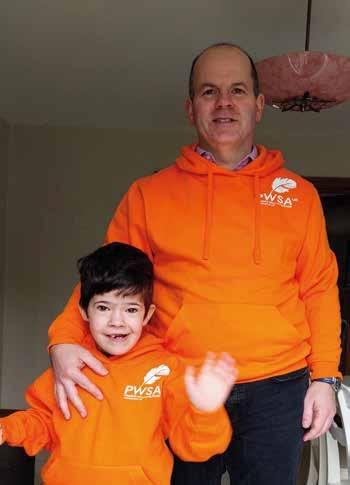
We know from listening to our community that we need to support adults with PWS and that, in part due to our own successes in understanding PWS better in early life, the challenges of living with PWS in adulthood are coming more to the fore. In this area, we already have the OWL newsletter and focus group as part of our ‘nothing about us without us’ approach, and it was because of the suggestions made at this group that we commissioned the PWS hidden disability lanyard; we are working on our website to ensure that there is a comprehensive section for adults and this should be launched early in the new year; and we have begun a project to assess the feasibility of different ways in which the Association can impact the quality of life of adults living in residential settings. However, there is much more to do and in the coming year you will see an increase in focus groups discussing adulthood issues such as the topic of ‘what happens when we as parents are no longer here for our PW child’ that is being discussed at the next Town Hall. This will allow us to plan a long-term approach to a complex area with the ultimate goal of delivering lifetime needs of safety, belonging and esteem.
Of course, to do this and in such turbulent times we need to prioritise securing the Association’s financial stability. We can only do this by diversifying our income and ensuring that we manage our resources prudently whilst ensuring that we continue to deliver against our strategic plans. We will shortly be publishing our first
Impact Report which will set out the difference made by the Association. This in turn will help us secure further support and funding so that we can continue with the development of our services and support.
Finally, to working in partnership. PWS is a rare condition and can be overlooked by mainstream research, health and social care and other support services. It is therefore vital that PWS agencies collaborate and work in partnership. We are developing stronger relationships with the Foundation for PraderWilli Research in the UK as well as the International Prader-Willi Syndrome Organisation. In this way we aim to become a stronger more united voice and resource for the PWS community.
Everything we have achieved this year and plan for the future is meeting my measurements of Responsible Growth, Good Governance and Continued Professional
Development. It is through the hard work of Susan Passmore in the early part of the year and more recently Jackie Lodge, with of course the unwavering support, diligence and excellence of our staff, that we continue to achieve and on behalf of the membership and Board of Trustees I thank them for that.
We are fortunate to have such a diverse, knowledgeable, and committed board of trustees who give of their time and expertise so freely. I would like to put on record my thanks to the board for all the work they do behind the scenes and driving the association on. There are, as ever challenges ahead, but we have a strong board of trustees and a skilled and committed staff team.
I would also like to thank the PWS community for their support and, in particular, for the phenomenal fundraising efforts that never cease to amaze me.
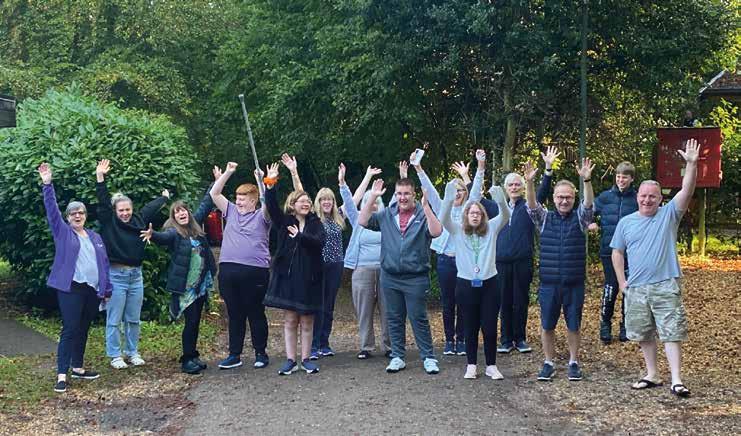
We want everyone in the PWS community to be able to be a member of PWSA UK so we have taken the decision to scrap membership fees.
It’s important to us that we represent everyone affected by PWS in the UK; children, adults, families, and people working in the field of PWS, so that everyone has a say in the Association, and everyone can access the
same services, information and support, whatever their financial situation.
From now on, you will be able to become a member by simply registering your details.
Currently, the cost of membership (administration, printing and posting the newsletter and PWS Journeys)
far outweigh the income from membership. In fact, did you know that it costs us around £8,000 a year to print and post out our magazines? That’s money we could be spending on providing even better support to our community.
Equally, our ethical policy states that we reduce our impact on the environment by becoming as paperless as possible. This means we will move away from printed newsletters and information and shift to electronic updates and communication.
We appreciate that this is not possible for some of you, and we are committed to providing hard copies of newsletters for those unable to access email or the internet.
We will also continue to provide printed copies of Wise Owl Feathers, our magazine for adults with PWS, which we know is highly valued by its readers. There are no plans to change this or to move to online only, as this would significantly reduce accessibility for many adults living in a residential setting.
We would like to know how these plans will impact on you. Will going digital affect your ability to access PWS News? If so, please let us know by emailing admin@pwsa.co.uk, or calling 01332 365676, or writing to us at PWSA UK, c/o Metcalf’s Commercial Decorators, 3 Deer Park Road, Moulton Park, Northampton, NN3 6RX
Current members don’t need to do anything - your membership will remain in place! If you currently pay for membership by standing order, you may choose to cancel this. However, PWSA UK relies on regular support from the community, so if you wish to continue these payments, or would like to set up a regular gift, then that would be hugely appreciated.
If you are not yet a member, now is the time to join!
Please visit www.pwsa.co.uk/gdpr-and-membership, and help shape the future of PWS with us.
Our first Town Hall meeting took place on 17th October, providing an opportunity for our members to meet with us and hear all about our work, as well as having their questions answered and finding out how they can help shape our future plans.
Hosted by Chair of Trustees Danny Leslie, and CEO
Jackie Lodge, the meeting, which took place virtually via Zoom, will take place twice a year as a means of engaging with and listening to our members in order to shape the strategic direction of the Association.
Danny set out the aims of the new Town Hall meetings, which would consist of a membership meeting with the Chair and CEO of PWSA UK to be held twice a year.
Jackie then gave a presentation setting out PWSA UK’s objects and financial position. The presentation also detailed work under the six strategic objectives:
To be the leading knowledge and information hub for PWS
To provide the best possible support to the PWS Community
To be the voice of those affected by PWS
To develop and maintain regional reach
To support and promote research into the management and alleviation of the challenges of life with PWS
To sustain the charity
The Association is focusing on 4 areas as a priority. These are:
Reaching all parts of PWS community
Including the four nations and all regions
Ethnic minority communities
Adults with PWS
Listening and acting (an example being the recent launch of the Sunflower lanyard)
Residential standards (Quality of Life)
Developing the section for adults on our website and our Wise Owl Feathers newsletter
Securing financial stability
Diversifying income
Telling our story
Partnerships and synergies
PWS community, working with the Foundation for Prader-Willi Research and IPWSO
Being a stronger voice for PWS community
Topics covered during the meeting included fundraising, staffing levels, supporting adults with PWS, peer-topeer support, support for increasingly complex issues, working together with other allied organisations to raise issues and influence, and support for older parents.
The next Town Hall meeting will be in April 2024 and will look at three issues in more detail, one of which will be longer term planning for adults with PWS.
It’s always fantastic to see as many of you as possible at one of our community events through the year, including our family weekend at Sandy Balls and our West Midlands Christmas party!
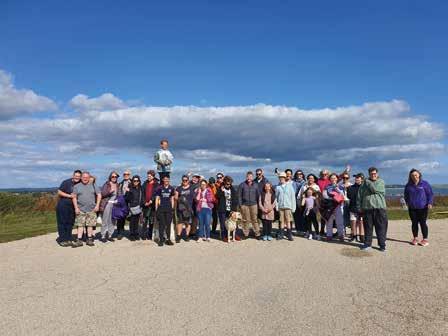

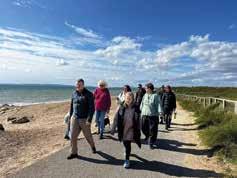

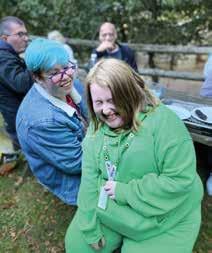
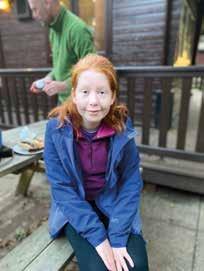
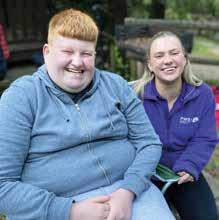
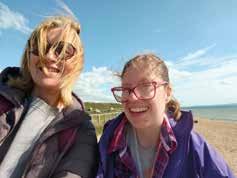

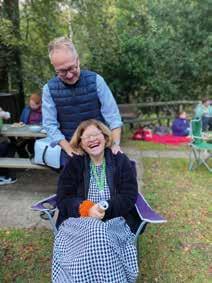
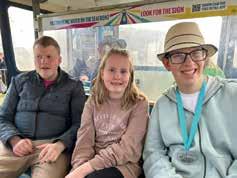

West Midlands Christmas party

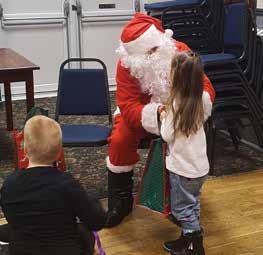
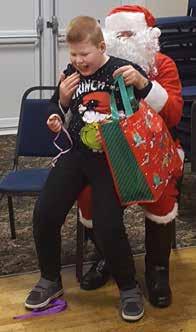
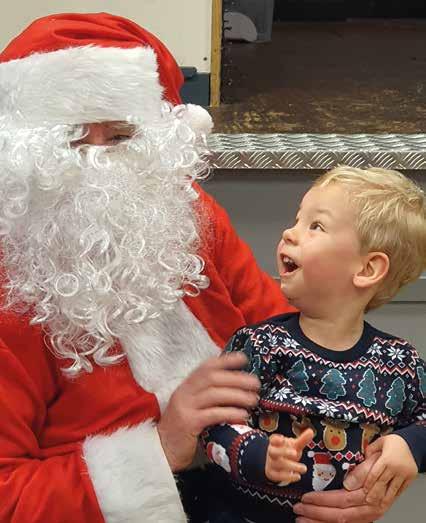
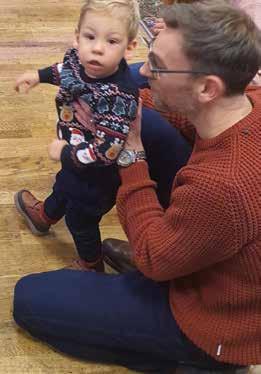

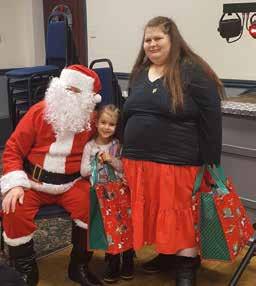
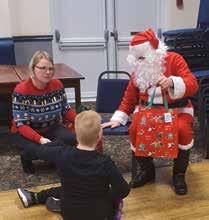
Arcadia Pharmaceuticals has launched a Phase 3 clinical trial testing the safety and effectiveness of ACP-101, an experimental carbetocin nasal spray, in treating hyperphagia in Prader-Willi syndrome.
The COMPASS PWS trial is expected to involve up to 170 children and adults aged five to 30, with hyperphagia, across more than 20 study sites across the UK and Canada.
ACP-101 was originally developed under the name LV101 by Levo Therapeutics, which was acquired by Acadia in June 2022. This acquisition also included the global rights to continue developing this medication and take it to market if it is approved.
Levo had previously sought approval from the U.S. Food and Drug Administration (FDA) for the carbetocin nasal spray. That application was supported by data from a Phase 2 trial and from CARE-PWS (NCT03649477), a
Phase 3 study in which a 3.2 mg dose, but not a higher 9.6 mg dose, significantly reduced hyperphagia in children with PWS.
However, the FDA rejected the application in January 2022 after an advisory committee voted that the available evidence was not enough to support the therapy’s effectiveness and that an additional trial was needed to confirm the nasal spray’s efficacy, even though it appeared safe and well tolerated by those who tried it.
The new Phase 3 COMPASS PWS trial will build on the previous Phase 3 clinical trial, where carbetocin nasal spray 3.2 mg was observed to reduce hyperphagiarelated behaviours.
If the trial proves to be possible, the COMPASS PWS data will be used to support the filing of a new application seeking the therapy’s approval by the FDA.

Did you know that you can now use the NHS app to sign up to be part of health research, including for PraderWilli syndrome?
Just log in and then click on the 'take part' button on your app, fill out some personal details and then select PraderWilli syndrome from the list of conditions to receive updates about any research opportunities in this area.
If you don't have the app then you can download it for free from whichever app store you use.
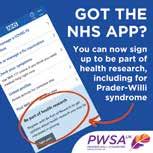
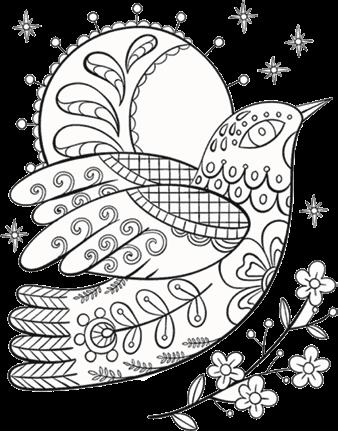
If you will be celebrating your birthday over the coming months then please let us know how you celebrated and don’t forget to include photos, so that we can share them in our magazine! Please send to admin@pwsa.co.uk
Happy birthday to everyone who has a birthday between now and our next edition in April!
Here’s a photo of Arlo, which was taken by his dad, Stuart, and will be seen on digital screens across London!
Stuart is a photographer, and this photo was recently selected as one of the top 100 portraits in the Portrait of Britain competition.
Well done Stuart and fantastic news for Arlo, who is the star of a winning portrait!
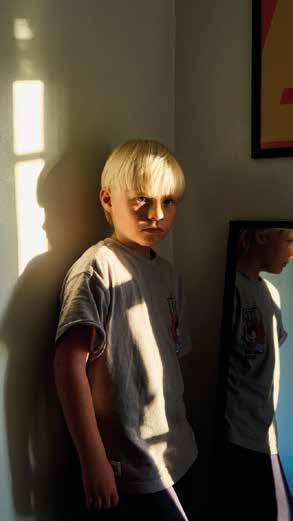


We hope you all enjoyed the festive season and that you are all fighting fit and ready for the New Year.
This year we have a fantastic range of fundraising events lined up – and we would love for you to come and join us. All our events so far are listed below - if you fancy a different challenge that isn’t included below, please let us know and we will support you in any way that we can. Don’t forget to check our events page at pwsa.co.uk/events too, as this has the most up-to-date event information.
Thank you!
Karen and Lizzie
Now this event is already filled for 2024 but if you would like to take part in the iconic London Marathon in 2025, please register your interest now! Erin, who ran it in 2023, said: “My family and friends absolutely loved it; they all had the best day ever, as did I. Thank you for giving me the opportunity to run in support of you. It really was an absolute honour. Thank you again for all you do. I think my family would be a bit lost without the PWSA!”
If you missed out this year, have no fear as we are back to test our nerves with the Skywalk: The Edge at the famous Tottenham Hotspur Stadium. We have 8 tickets available to walk up the side of the stadium and round the golden cockerel with the option to abseil back down.
How amazing does this sound… watching the sun rise over the beautiful Snowdonia National Park. We are planning to set off on our trek up Snowdon at 1am to reach the summit at 5am to witness this unforgettable experience. Currently there are 25 places available, let us know if you are interested!
Are you interested in jumping out of an aeroplane hundreds of feet in the air?! If so, this may be for you. We are currently planning this hair-raising event at Langar Airfield, Nottingham. If you would like to know more about this once in a lifetime event, please let us know. Jodie, who previously took part, said: “I was absolutely terrified but my daughter who has PWS has such major issues daily, that I thought I needed to get on and put myself out of my comfort zone. What an amazing experience it was and I loved it, whilst raising funds for the charity that supports us. I want to do it again.”
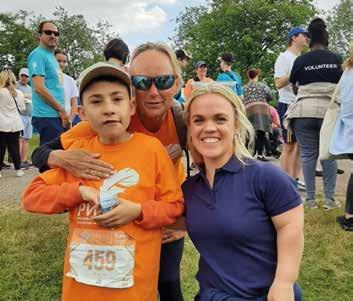
We attended our first event at Windsor Great Park this year, and let’s just say it’s not one to be missed. With a sensory 1k, 1k, 5k and 10k course you can run or walk, this event has something for everyone.
This half marathon takes you over the famous Tyne Bridge from Newcastle to South Shields. We are hoping to have some special guests take part in this race, so keep your eyes peeled for training updates and let us know if you’d like to join.
We would like to thank anyone who has previously taken part in any of our fundraising events, anyone who is thinking of joining the events above and, of course, those of you who have held your own events and taken on your own challenges – we are so grateful.
Events are so important as they not only raise awareness for PWS, but they help us raise vital funds to support our research projects, community days and most importantly we can keep our help line open to offer guidance and advice when needed.
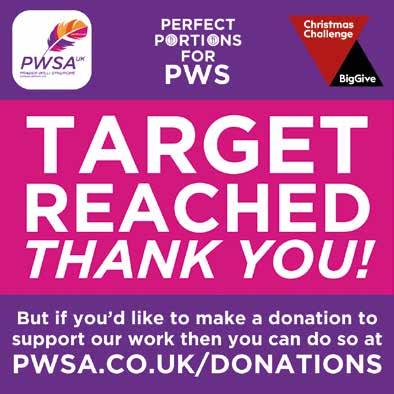
We are very pleased to say that we reached our fundraising target of £7,000 as part of the Big Give Christmas Challenge. The target was reached in just under a week, which means we will now be able to go ahead and fund our Perfect Portions for PWS project.
Created with the support of dietitians, these resources will clearly show portion size by age and the types of food that someone with PWS should be eating.
This information will be provided in plain English and with clear visuals for those with PWS so they learn about what they are eating and how it affects them. We will also provide information for parents, carers, hospitals, and schools to ensure that those with PWS are eating healthily and in the correct proportions, wherever they are.
Watch this space for further updates on this exciting project!
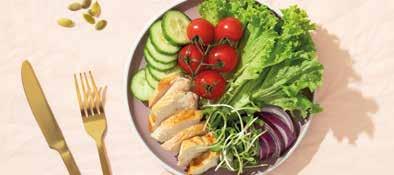
Well done to Bessie Stevens, who raised an impressive £2,341 by taking part in the Victoria Park Half Marathon. She says: “The weather was perfect for the run - crisp and sunny! I actually really enjoyed it. It was 6.75 laps around the park, so got slightly tiresome toward the end but not too bad. I ran it in 1:52, so faster than I’d anticipated.”
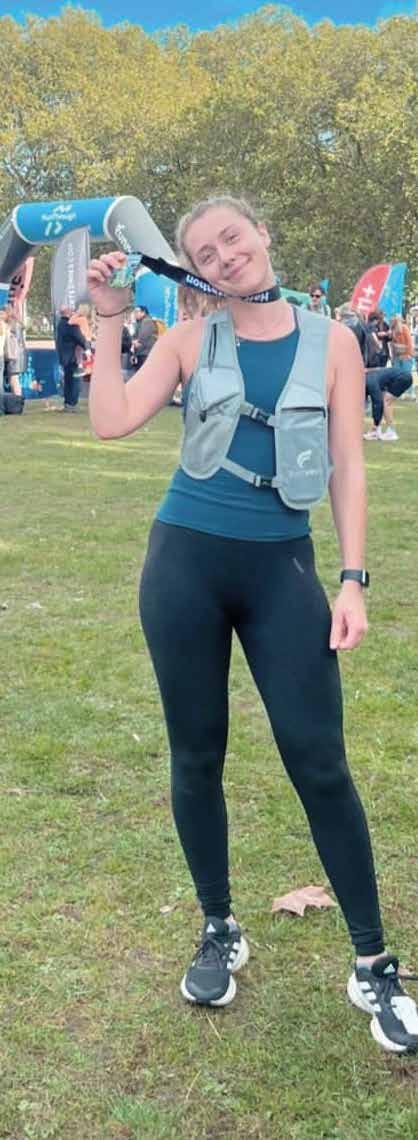
On 15th October, Brodie Heath ran the Amsterdam Marathon in 3 hours and 24 minutes, raising £620 plus gift aid for PWSA UK.
This was Brodie's first marathon and despite cramping from 35km onwards and numerous downpours of hailstones, he says he is extremely pleased with this for a first attempt.
Brodie works as a Clinical Nurse Specialist at The National and Specialist CAMHS Mental Health of Intellectual Disabilities Team/ Specialist Prader-Willi Syndrome Service at The Michael Rutter Centre in South London. He decided to fundraise for PWSA UK as he works closely with children and young people with PWS and their families and often hears of the invaluable support that PWSA UK provides.
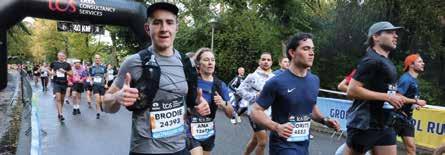
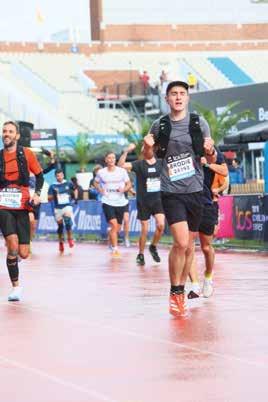
A huge well done to Kevin Hubbard who completed a very hot and humid Standard Chartered Singapore Marathon in 2 hours 59 minutes, raising a very impressive £7,334 in the process!
Kevin says: “The run was great - really good atmosphere as well, and it only took a couple of days for the legs to recover!”
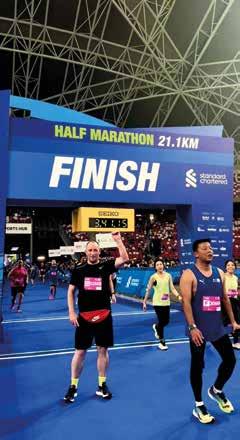

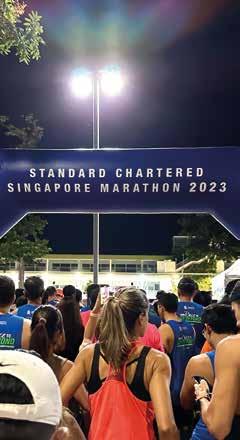
Well done to Pat French and her sister, Debs, who completed the Manchester Half, raising a fantastic £1,462 for PWSA UK!

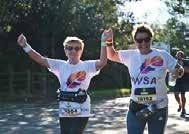
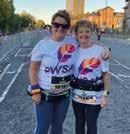
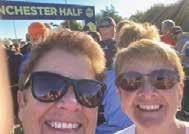
A fundraising event in aid of PWSA UK took place at The Gaping Goose pub in Wibsey, Bradford. Thank you to Mac McCallion for this write-up:
On 17th June 2020, our first grandchildren were born, twins Hallie and Vinnie. Not long after they were born it became apparent that not all was well with Hallie and, after some time, she was diagnosed with PWS.
On 5th August 2023, Tracey, Hallie’s grandmother came up with the idea to put a charity event on to raise some money for PWSA. It was held at The Gaping Goose pub and hosted by the landlady and landlord, Jayne and Garry Walls, with the theme of A Night with the Stars.
Tracey rallied the troops, i.e. the customers and friends, to perform on the night with performances ranging from Elvis, Boy George, ABBA, through to Amy Winehouse and many more.
Raffle prizes were donated and raffled off on the night, collection boxes rattled and, with some previous small raffles held throughout the year, again in the pub, we managed to raise £1,020 It was a great night and a great sum raised by all who attended!
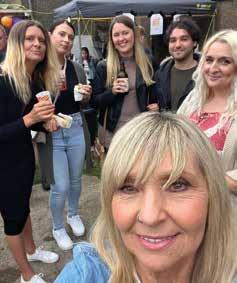
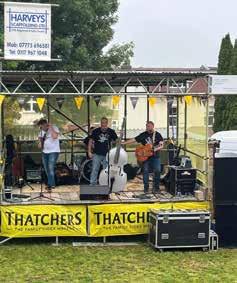
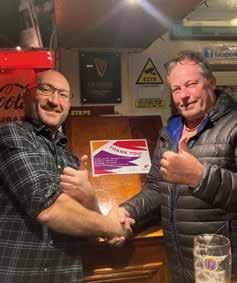
Get a copy of our new Fundraising Toolkit!
Have you seen our new-look Fundraising Toolkit? The toolkit contains all the information you need to ensure your fundraising event goes as smoothly, as successful and as enjoyably as possible!
It includes useful information, advice and tips, as well as resources such as posters, sponsorship forms, bunting and a totaliser – and don’t forget that our fundraising team is here to support you too!
If you’d like a copy then please email admin@pwsa.co.uk, or visit pwsa.co.uk/fundraising where you can fill out a form.
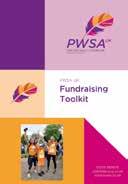
Our 2024 events calendar is already starting to look busy! Below are the events and activities lined up so far, but please check pwsa.co.uk/events for the most up-to-date information and details of who to contact for each event.
March
Details of events TBC.
April
20 OWL Focus Group conference.
May 4 Tottenham Skywalk.
10-14 PWS Community Weekend at Sundrum Castle, Scotland.
17-20 PWS Community Weekend at Southview Holiday Park, Skegness.
June
July
7 Parallel Windsor.
August
Details of events TBC.
September
7-15 Ride Across Britain. Cycle from Land’s End to John O’Groats.
8 Great North Run.
20-23 PWS Community Weekend at Sandford Holiday Park, Dorset.
October
12 Face to face conference in Southampton for parents of under-16s.
November
Details of events TBC.
December
Details of events TBC.
Windsor 2023
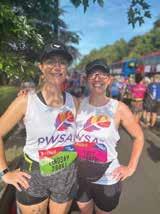
North Run 2023
